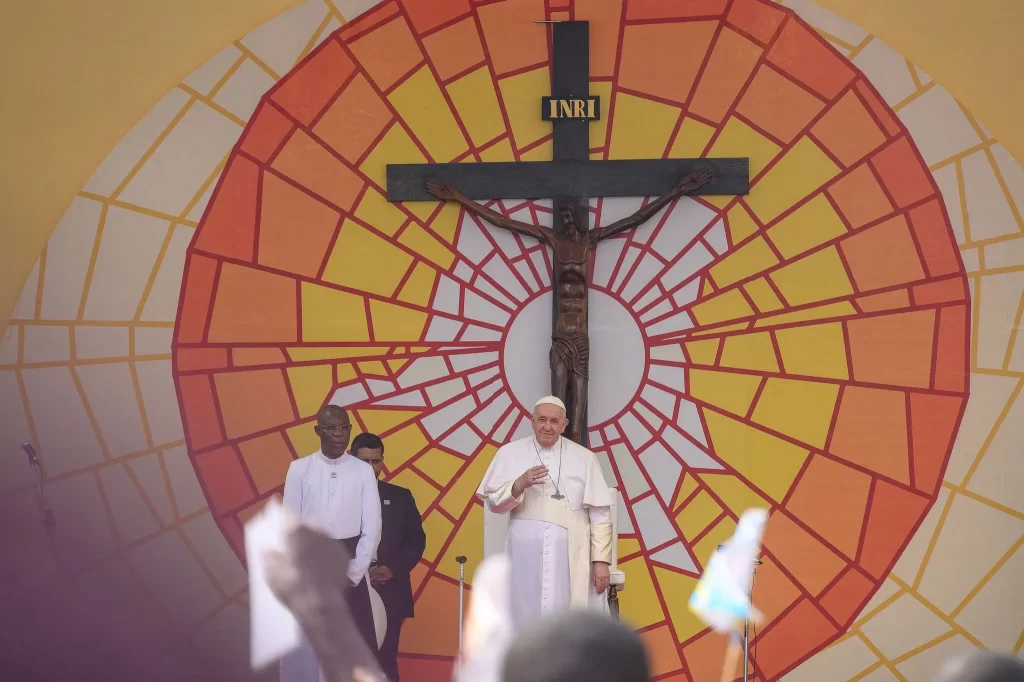
KINSHASA, Democratic Republic of Congo — Pope Francis put down his prepared remarks and instructed the stadium packed with young Catholics in Congo to make clear their opposition to the corruption that had hobbled their country with a single, rousing voice.
“All together,” Francis said. “No to corruption.”
The tens of thousands of faithful obliged in a roaring chant as the pope’s hands lifted off his knees.
Slowed by age and a bad knee, Francis, 86, had seen the global dimension of his decade-old papacy — often mired in Vatican intrigues and ideological wars — lose energy with him. As papal trips to the church’s far corners have become more commonplace, Francis’ own travels abroad, often in pursuit of interfaith dialogue or atonement for the church’s sins, have often failed to draw massive crowds.
Not so in Congo — an overwhelmingly Christian nation that is the victim of unfathomable bloodshed and exploitation at the hands of outside powers and armed neighbors hungry for its mineral wealth — where Francis has drawn enthusiastic crowds of a million or more.
They have provided a fresh reminder of the strength not only of his pastoral message of peace and forgiveness but also of the political dimension of his power.
In Africa, while avoiding partisan politics, Francis has not been shy in tackling the most sensitive issues. He has called out corruption. Speaking in strong, even angry, tones, he has shamed the international community for what he called Congo’s “forgotten genocide.” Most of all, he has sought to bring global attention to the suffering of lands that are too easily overlooked.
In return, the Congolese, thankful for the pope’s acknowledgment of their plight and expressions of solace and hope, have given an instant shot in the arm to a papacy seemingly in its final act.
“The pope directs the world’s spotlight on us. The world sees us,” said Tito Mwamba, 52, a priest who sat in a front row of the stadium in the capital, Kinshasa, where the pope convened a meeting of Catholic youth and educators on Thursday. “There was a huge need.”
Much of that need was for mere recognition of the suffering of a nation where more than 100 armed groups perpetuate the spasms of violence that have wracked eastern Congo since the 1990s, killing hundreds of thousands and displacing millions.
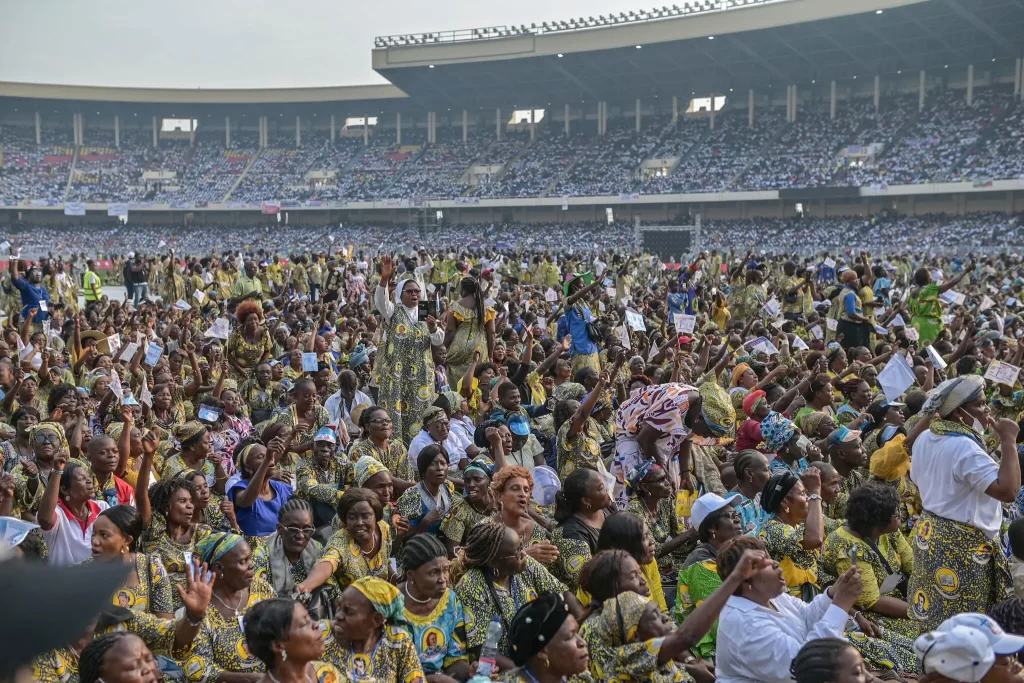
The pope convened a meeting of Catholic youth and educators at a stadium in Kinshasa on Thursday. Moses Sawasawa/Associated Press
But Francis, he said, got something out of his visit, too. “To see so many Catholics in a big country on an enormous African continent counts a lot. Despite his health, it gives him a boost, it gives him more force to finish the journey of his mission.”
For Jean Paul Kahamba, 32, a teacher who had come to cheer the pope on Thursday, the symbiosis was even simpler.
“His visit shows that Africa exists,” he said. “It’s not the first choice for tourism maybe, but there are people here. Congo is not just minerals. It’s people. It’s not just problems. The headlines are always problems. We are more than that.”
As the crowd erupted in chants around him, Mr. Kahamba said that Francis, who he thought was burdened by problems in Rome, received a reminder that the faith was not closed up in old churches but alive in the world and lived by a mass of humanity. “He gets hope in the future,” he said. “It’s not theoretical. It’s here.”
Africa’s estimated 265 million Catholics make up about 20 percent of the world’s 1.3 billion followers. But that number is growing, fueling talk in Rome about a potential African to succeed Francis or at least be in the conversation to become the first Black pope. On Friday, Francis travels to South Sudan, where he has been personally involved in peace negotiations.
But it is Congo that is home to the church’s largest following on the continent — nearly half of the country of about 100 million people is Catholic — and its most vibrant and influential.
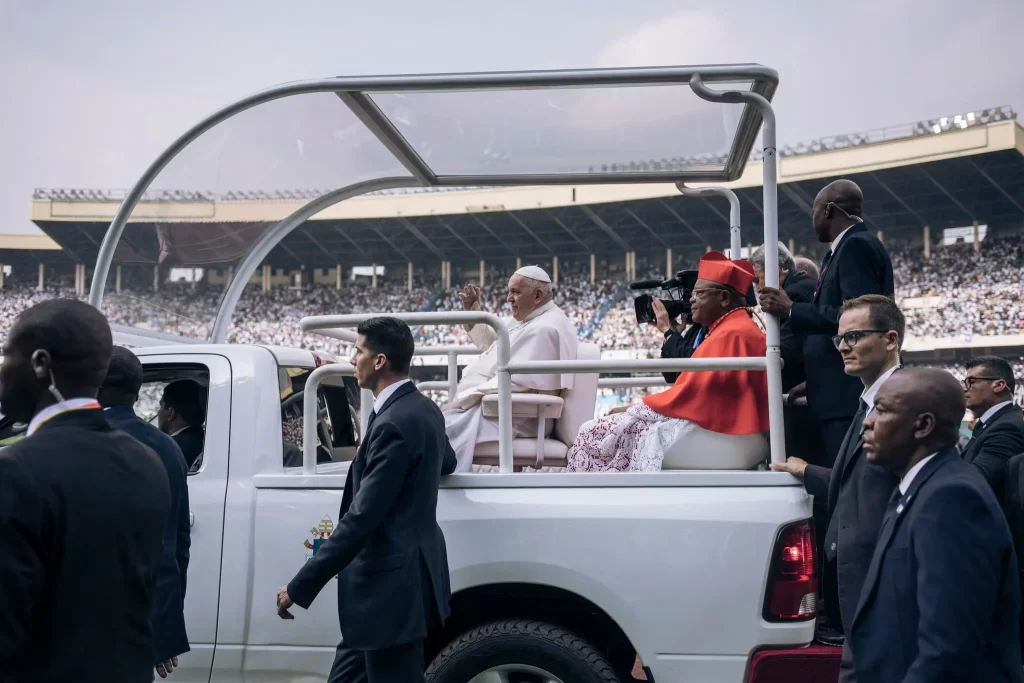
Pope Francis arriving at the stadium. Jean Paul Kahamba, a teacher who came Thursday to see the pope, said, “He gets hope in the future. It’s not theoretical. It’s here.” Alexis Huguet/Agence France-Presse — Getty Images
It is also a country that is ravaged by seemingly intractable conflicts, despite, or because, of its treasure trove of minerals such as cobalt and gold, coveted by greater powers from the United States to China.
“His voice makes an echo of the suffering of Congo,” said Christian Ngazain, 44, a priest at the stadium on Thursday, who lamented the world’s “silence” in the face of atrocities. “Because of the pope’s international position we are sure that his message will be listened to.”
He said that Africa in return had the power to put Francis at ease.
“All the young people filling the stadium shows him the vitality here,” he said. “That we have a secure future.”
That vitality, and the pope’s gratitude for it, have been on constant display. At least a hundred thousand people, waving flags, perched on rooftops, cheering from overpasses, lined the streets to greet him after he arrived in Kinshasa on Tuesday. Children in Catholic School uniforms turned entire stretches of road blue and white.
More than a million people filled an old airfield on Wednesday for an open-air papal Mass. The faithful climbed up on the wings of old planes to get a better view as Francis waved at hundreds of little girls dancing for him in their communion dresses. “I have very much looked forward to this moment,” he said.
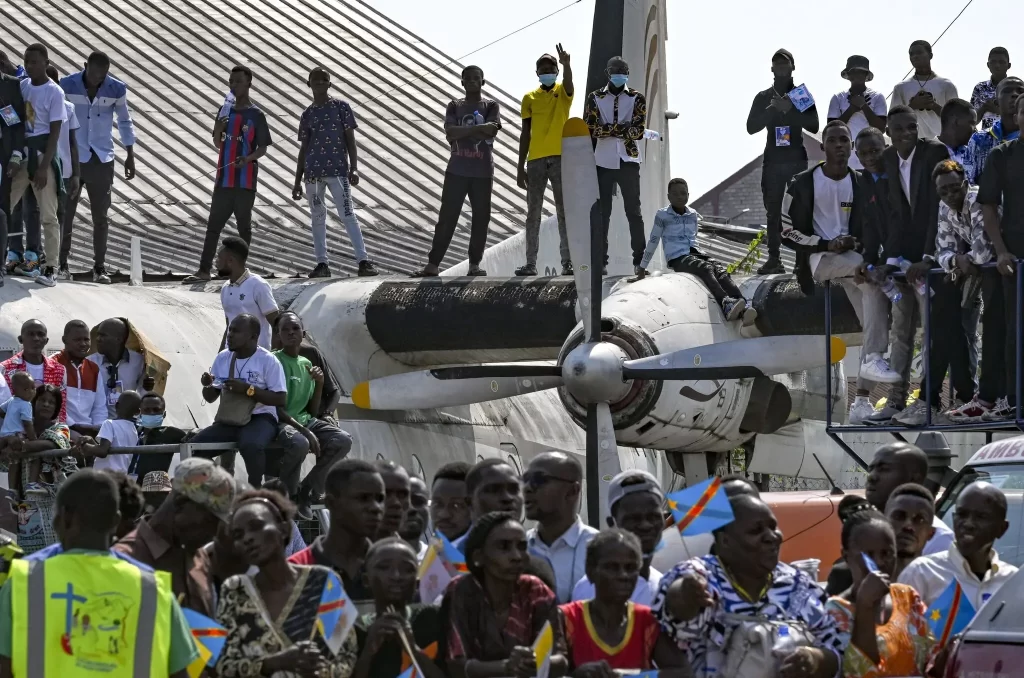
More than a million people attended a papal Mass on Wednesday at an airport in Kinshasa. Ciro Fusco/EPA, via Shutterstock
Even the day’s painful afternoon meeting with the victims of gruesome crimes in the country’s embattled east, when survivors put machetes and knives on the floor near the pope to punctuate the horror of their accounts, seemed to remind him of his mission. “Thank you for these testimonies,” he said gravely.
And on Thursday, the mere sight of the white Toyota pickup that had been converted into a popemobile triggered an eruption in the stadium, already pulsating with music and dancing under the searing morning sun.
“The pope travels the world, but it’s different when he comes here,” said Iyefa Paulus, 47. “We are joyous that he has come here, to face us.”
Laurent Makesa Pasinya, 6, walked around the stands in the red robes of a cardinal (“He has the vocation,” his mother said). Puati Longo, 44, wore a leaf-patterned shirt spotted with drawings of Bibles and the motto, “The Bible is my weapon.”
“We have so many difficulties,” he said, “but the pope coming makes me so happy.”
When Francis had reached the stage, and an aide rolled his wheelchair to his seat, he took in some performances of traditional dance. Speakers, using the French still spoken in Congo decades after throwing off Belgian colonial rule, concluded with impassioned calls of “Vive le Pape!”
“I am delighted to meet you face to face,” Francis said.
In his speech, he warned the country’s young to avoid the “temptation to point a finger at someone, to exclude another person because he or she is different; beware of regionalism, tribalism, or anything that makes you feel secure in your own group.”
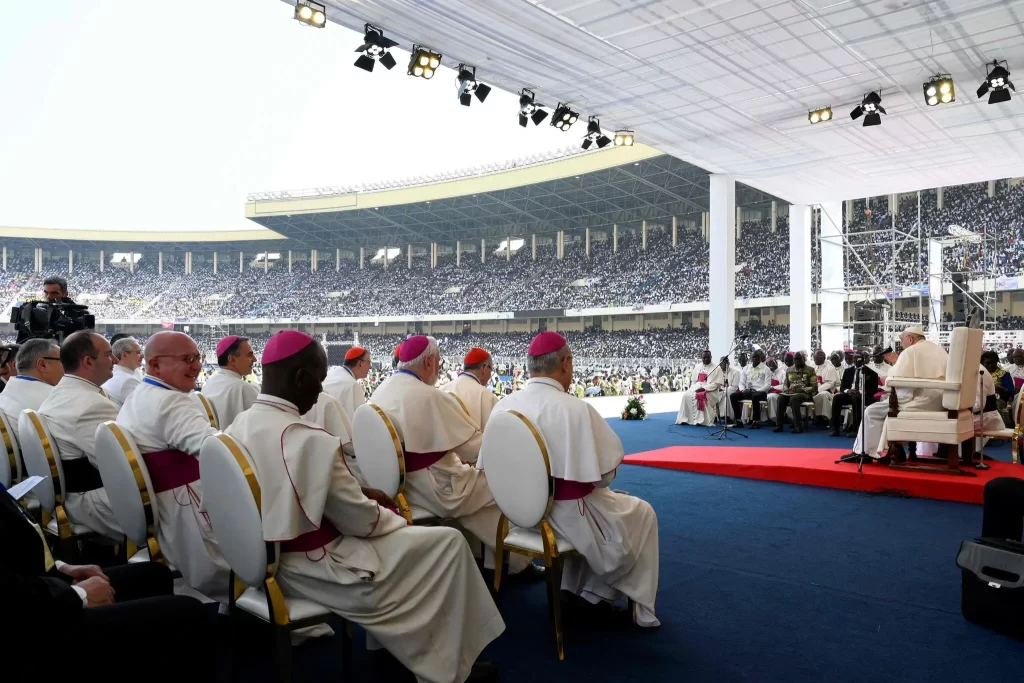
A photograph released by the Vatican showing Pope Francis at the stadium on Thursday. Vatican Media, via Agence France-Presse — Getty Images
To demonstrate his point, and grab the crowd’s attention, he put down his speech and instructed the faithful to hold hands “to feel yourself one church and one people” and to sing together a song, which prompted full-throated choruses of hallelujah. “Your good,” he told them, “depends on the other’s.”
That crescendo climbed when he urged the Catholics to “stop the spread of corruption” and to not permit themselves to “be manipulated by individuals or groups that try to use you to keep your country in the grip of violence and instability.”
He led them in the “no to corruption” chant, but his orchestration touched such a nerve that the moment got away from him. A good chunk of the crowd, in the local Lingala language, took it significantly farther.
“Fatshi, prepare yourself, your mandate is finished” they roared, using the nickname of the president, Félix Tshisekedi, who claimed an election victory in 2019 even after polling monitors of the Catholic Church, which is an important guarantor of democracy in the country, could not vouch for his win. “Fatshi, the game is over, go away,” they thundered.
The pope tried to continue his speech, but a master of ceremonies with a booming voice had to interrupt to admonish the crowd to be quiet.
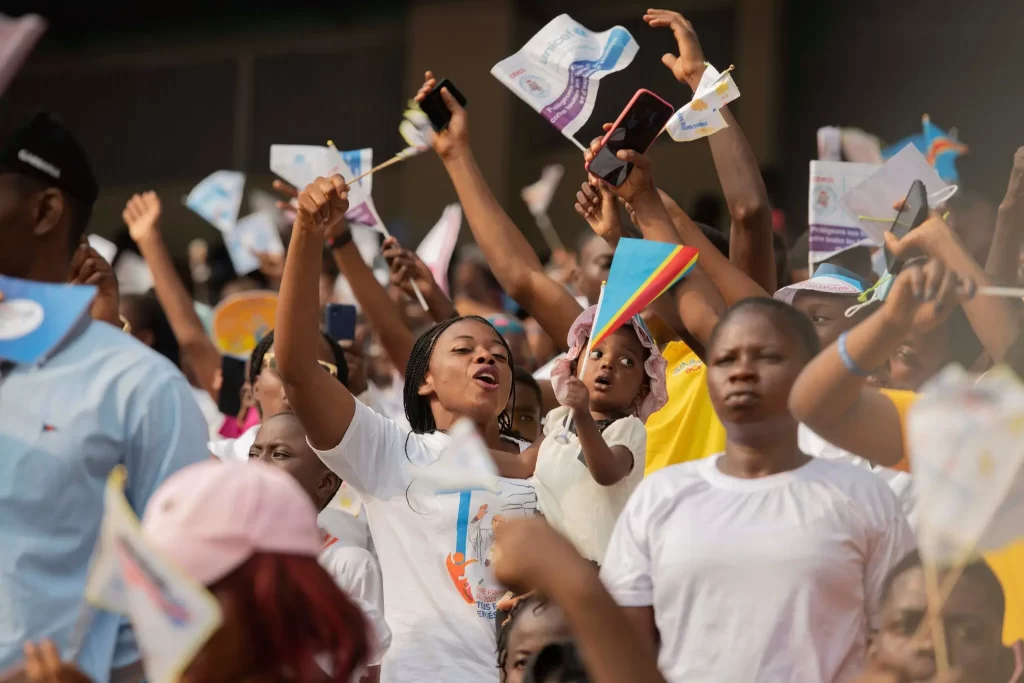
Excitement in the stadium stands on Thursday. Moses Sawasawa/Associated Press
FEATURED IMAGE: Pope Francis on Thursday at Martyrs’ Stadium in Kinshasa, the capital of the Democratic Republic of Congo. He addressed some 65,000 young people. Arsene Mpiana/Agence France-Presse — Getty Images



